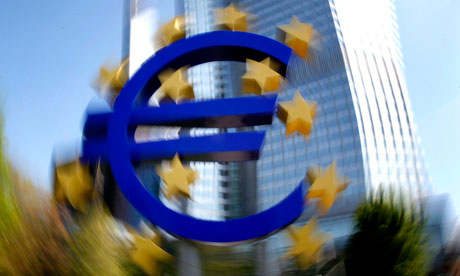By the end of this month, we should know whether the European Central Bank (ECB) plans to expand its asset purchase programme beyond covered bonds and asset-backed securities (ABS).
Until now, the ECB's desire to initiate its own quantitative easing (QE) programme has been stymied due to entrenched opposition from Germany's Bundesbank. Now, with fears gathering that the eurozone could follow Japan's economy into a prolonged deflationary spiral, ECB president Mario Draghi now finds himself in a much stronger bargaining position, but he, himself, admits that what the eurozone really requires is structural reform.
The ECB introduced an ABS and covered bond purchase programme during the final quarter of 2014 in an attempt to grow the size of its balance sheet to €3 trillion (£2.3 trillion). Theoretically, this should help to depreciate the euro, thereby spurring exports and economic activity through higher asset prices (and wages). The trouble is that the illiquid nature of the ABS market, coupled with a scarcity of quality debt securities, means that the ECB will be hard-pressed to achieve the desired stimulus from its existing programme. Indeed, there is evidence to suggest that the ECB's foray into these markets has already resulted in a substantial reduction in traded ABS volumes. As the ECB intends to expand its balance sheet by around 50 per cent, the only realistic option to achieve this (within a meaningful timeframe) would be for the bank to start purchasing government bonds.
The central aim of the ECB would be to promote economic activity through a reduction in the general level of interest rates in the eurozone banking system. The prospect of a beefed-up asset purchase programme is already having an effect. Diminishing yield curves for eurozone bond issues suggest that markets have been pricing in this scenario for some time, although the publication of weaker-than-expected manufacturing data from the region has increased the likelihood of the programme (last week, yields on five-year German bunds slipped into negative territory). The disappointing news on the PMI data was accompanied by press reports that Mr Draghi had confirmed that interest rates in the currency bloc are set to stay at ultra-low rates "for a while longer". Europe's banking supremo went on to say that "the exchange rate is not an ECB policy target", but the euro duly hit a five-year low against the US dollar anyway.
With renewed opposition to the single currency now growing across Europe – it isn't the sole preserve of Nigel Farage – the move by the ECB could have unforeseen political ramifications. The experience of QE in the US, Japan and the UK suggests that asset prices – including those of equities – should rise in the eurozone if the ECB does indeed follow suit, while interest rates will be bolted down. That's obviously good news for any of our readers who hold shares within the currency bloc, but rather less appealing for savers (ie Deutsche volk) and those who rely disproportionately on interest income (ie pensioners).
These factors could be grist to the mill in a year shaped by political risk. The euro has also faltered because of concerns over the outcome of a snap election in Greece to be held on 25 January. The leftwing Syriza coalition has pulled ahead in opinion polls on an anti-austerity ticket. The coalition's pledge to either push for debt clemency, or renegotiate the terms of continued EU subsidy, has gained widespread support in a country wracked by soaring unemployment and rising poverty.
Although Greece is reportedly running a budget surplus, it's doubtful whether Brussels – or more accurately Berlin – would be prepared to grant Greece more favourable terms on its bailout; the danger being that other countries such as Portugal and Spain might then want to reconsider their own fiscal arrangements.
Polls indicate that the Greek electorate is rather less keen on the nuclear option of pulling out of the single currency altogether. But if Syriza is genuinely intent on forcing the issue, the option to expel Greece could be enforced by the ECB. This would immediately cut off Greek banks from the transfer system, thereby causing temporary paralysis in the Greek economy.
We've been here before, of course. But analysts claim that an exit scenario is now less likely than in 2012 because bond yields have collapsed throughout the periphery eurozone economies. However, those rates could rapidly tick up again if a Greek exit creates a precedent. It doesn't bear thinking about the market reaction if, say, Italy was to follow the example of the Greeks. So far, even the unlikely prospect of a Greek exit is leaching support away from the euro in currency markets; a so-called 'Grexit' would probably result in capital controls to counter a vast outflow of capital from the eurozone financial system in favour of safe-haven currencies.









